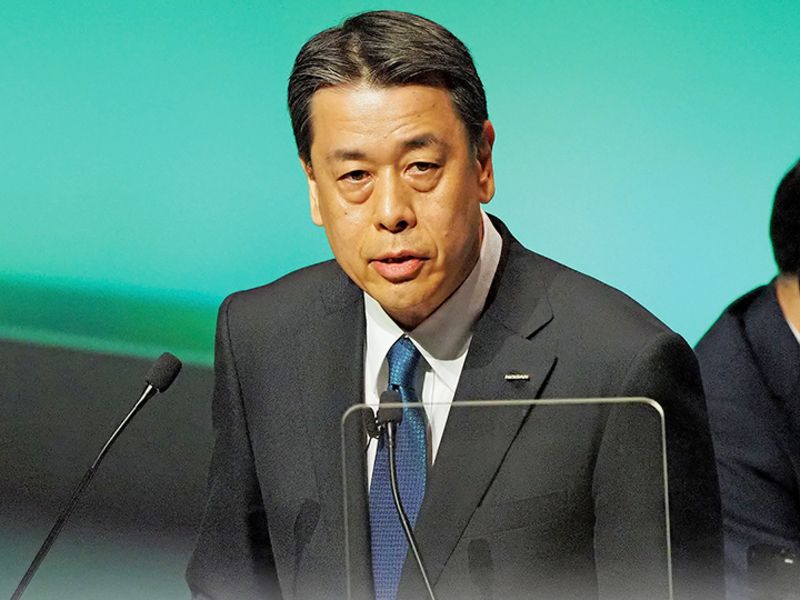
TOKYO — Nissan CEO Makoto Uchida tried selling the automaker’s new revival plan to skeptical shareholders last week amid an angry showdown over everything from his management style and corporate vision to board member pay and the company’s plunging share price.
Some attendees at the June 29 annual shareholders meeting even harked back wistfully to the Carlos Ghosn era: One praised the indicted former chairman’s strong leadership, another blamed his downfall on a conspiracy among Japanese prosecutors and government bureaucrats.
It was Uchida’s second faceoff with shareholders since taking office Dec. 1. An equally contentious exchange erupted in February at an extraordinary shareholders meeting called to appoint him, as the newly minted CEO, and other executives to the board of directors.
In his latest appeal, Uchida pledged that the midterm plan unveiled in May would restore the embattled carmaker to a growth trajectory, but he warned a full rebound still needed time.
One benchmark of recovery, he noted, would be a return to positive free cash flow. He predicted that would happen sometime between October 2021 and March 2022. Nissan, which just posted its first full-year net loss in 11 years, bled ¥641 billion ($5.95 billion) in cash from its core automotive business for the year. But Uchida said the net cash position is still flush enough to get the company through the COVID-19 pandemic thanks to newly secured lines of credit.
Uchida insisted the midterm plan plots a path to full recovery in four years. The plan aims to restore operating profit margin to 5 percent and increase global sales about 9 percent to 5.38 million vehicles for a 6 percent world market share. The strategy slashes costs and closes factories to reduce bloated global production capacity of 7.2 million to 5.4 million vehicles.
“What we showed you, as a forecast, is the level that is feasible, achievable, a level that we can deliver,” Uchida said of the plan, dubbed Nissan Next. “We are seeing better results, but it will take time. … I am committed to putting Nissan back on a growth track.”
Nissan hosted a slimmed-down version of its annual shareholders meeting, which usually draws thousands of people to a cavernous convention center in Yokohama. This year, as a precaution during the pandemic, Nissan allotted only 400 seats in its headquarters’ auditorium. Attendees were required to wear masks, and Nissan skipped holding a post-meeting lunch reception.
Last year, 2,814 people attended, and the meeting ran nearly three and a half hours. Only 295 turned out for this year’s gathering, and the event lasted less than two hours.
Shareholders blasted Nissan on a range of issues, from director compensation and business relations with partner Renault to Ghosn’s legacy.
The tumbling share price was another sore spot. Nissan shares initially advanced after the midterm plan was unveiled. But the stock has since retreated and is down 36 percent from the start of the year. Nissan shares have lost more than half their value since Ghosn’s arrest.
On May 28, as part of its midterm plan, Nissan issued pay cuts to executives and scrubbed the year-end dividend to investors among steps to right the foundering ship.
One shareholder criticized the board’s decision not to cut the compensation of outside, nonoperational directors, whose pay stays the same. Keiko Ihara, the outside independent director who chairs the compensation committee, defended keeping their pay steady as way to separate the responsibility of those charged with executing the business plan from those who oversee it.
Another shareholder slammed French partner Renault, which owns 43.4 percent of Nissan, as dead weight in the alliance because French people “excel at art” but are “weak” in technology.
Other shareholders expressed veiled sympathies for Ghosn, or at least his management style.
One said Nissan still suffers from a credibility problem, more than a year after the arrest and ouster of Ghosn for alleged financial misconduct, because of the way the scandal was handled.
The attendee said Nissan still hasn’t shaken the impression that Ghosn’s arrest was a conspiracy between prosecutors and the Japanese government’s powerful Ministry of Economy, Trade and Industry: “That’s the theory, which is understood as a convincing theory among the public.”
Motoo Nagai, chair of Nissan’s auditing committee, denied any such plot.
“I know that in the media they have talked about this being a conspiracy. But there is no fact whatsoever to this argument,” Nagai said. He added that an independent external task force as well as an outside law firm Nissan hired to investigate the matter both uncovered misconduct.
Another shareholder said that Nissan’s recovery from slumping sales and plunging profits has been too slow because the new management is fragmented, indecisive and uninspiring.
“What you need now is top-down strong leadership. You shouldn’t just spend time on democratic discussion. We need dictatorship,” the shareholder said. “Ironically, when Mr. Ghosn arrived at Nissan, in five or six years, he made [recovery] a reality. That’s what Nissan needs.”
Uchida responded that he is “100 percent leading” the revival. And he reiterated his previous wager, made at the February meeting, to resign if he can’t pull Nissan out of its doldrums.
“I said, ‘If Nissan’s performance does not improve, please fire me. Please dismiss me,’ ” Uchida recounted. “That’s what I said. And this policy remains unchanged.”